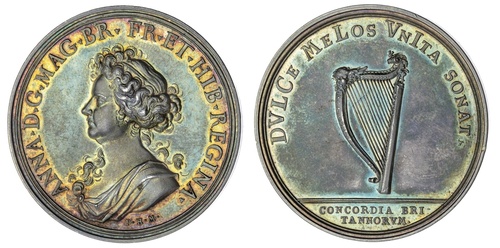
Auction: 22007 - British and World Coins and Commemorative Medals Autumn Auction
Lot: 783
The Concord of Britain, AR Medal, 1711, by P. H. Müller, ANNA • D • G • MAG • BR • FR • ET • HIB • REGINA •, draped bust left, rev. DVLC
Substantial political pressure had built up during 1710. Queen Anne secured the dismissal of a number of prominent Whigs including Sunderland and Godolphin, and, with the advice of Harley, formed a predominantly Tory administration. Parliament was dissolved in September, and in November, a Tory government with a substantial majority was elected. Despite the election of an isolationist party, both Whigs and Tories initially urged Marlborough to retain command of the Allied forces. By 1711, secret negotiations were underway with the French with a view to ending Britain's involvement in the war. Political dissention was rife.
The new Tory government, perhaps in an effort to force Marlborough into support for the negotiations for peace, charged him with embezzling funds meant for the army. He produced Queen Anne's signed warrant allowing him to deduct 2 ½ percent of the pay of the foreign contingents in the Allied army for use in the secret service. All the foreign powers, including the King of Prussia and the Elector of Hanover, confirmed that they believed that these funds had been properly used. Nevertheless, he was dismissed and went into temporary exile in Holland and Germany, only returning to England in 1714. Command passed to Ormonde who had failed so dismally at Cadiz.
It was at this point that Muller engraved this medal, celebrating 'The Concord of Britain'. It was a singularly ill-timed eulogy and the relative rarity of the medal might well be explained by a widespread perception of its inappropriate nature.
Subject to 20% VAT on Buyer’s Premium. For more information please view Terms and Conditions for Buyers.
Sold for
£6,000
Starting price
£600




